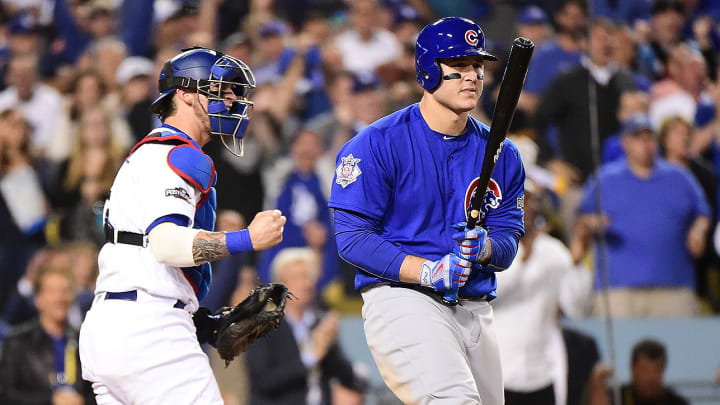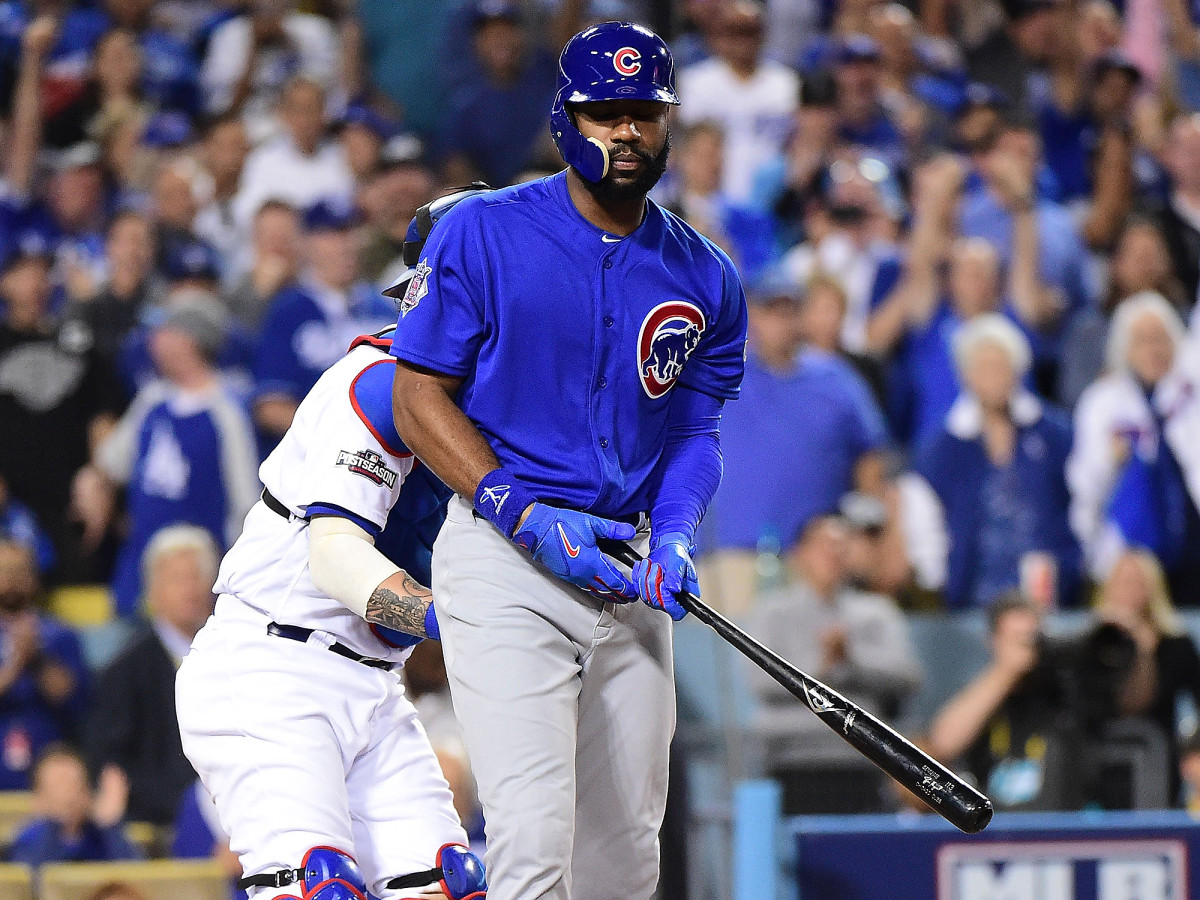After falling behind in NLCS, Cubs’ pennant hopes rest with slumping offense

LOS ANGELES—Baseball managers can be difficult to read sometimes, but when the Cubs’ Joe Maddon says, “We’re not hitting the ball hard,” I think he means they are not hitting the ball hard. For supporting evidence, we present the last two games of the National League Championship Series. The Cubs lost both. They have not scored in 18 innings. If they don’t score in the next 18 innings, they will fly home in a coffin.
Whoops. Got a little too serious there. Miguel Montero would like me to remember that this is a game—me, you, and most importantly, his Cubs teammates.
“I think we’re trying to do too much,” Montero said. “We need to be ourselves. We just need to calm down and take one pitch at a time. Don’t try to be the hero and hit a three-run homer with nobody on.”
Three Strikes: Hill, Dodgers shut out Cubs in Game 3 to take 2–1 NLCS lead
The Cubs won 103 games this year. They have not looked like that team the last two games. This is baseball, of course—slumps are inevitable. But this one feels perilous. Nobody doubts the Cubs’ talent, or their desire, or their heart. But their production in this series has been alarming,
Is the pressure of winning the Cubs’ first World Series since 1908 getting to them? That’s the easy answer, but not necessarily the correct one. They are not really pressing in a conventional sense. They’re taking pitches, being patient, waiting for something they can hit. As Maddon said: “Overall, the at-bats haven’t been bad. We’re just not hitting the balls. We’re not striking it well.”
We should pause here to give the Dodgers credit, though the box score did a fine job of that already. Yasmani Grandal and Justin Turner each hit home runs for the Dodgers. Rich Hill mixed his pitches and flummoxed the Cubs, and hey, look: we are back on the Cubs again. Wasn’t that quick?
• What you might know—and might have forgotten—about Cubs' NLCS history
The Cubs had one extra-base hit, a Dexter Fowler double. Their poor hitting is the elephant in the room, and it’s sitting on them. Maddon said his concern is “mental,” but how do you fix that? His solution is to stay calm and confident, and hope the Cubs follow along instead of thinking about the fact they haven’t won the World Series since 1908 and aren’t hitting worth a damn. I guess it’s better if they listen to him instead of me.
The Cubs have 24 RBI in seven postseason games. Their pitchers have six of them. And even the pitchers may be frustrated by now. Jake Arrieta was OK but not great in Game 3, and Montero, who caught him, said: “It’s hard to go out there and pitch when your team’s not scoring runs. You try to be perfect. It’s hard to pitch like that.”
Is this like 2015, when the Cubs were both swept and overwhelmed by the Mets?
“Not really,” Montero said. “To be honest, I think the Mets … I don’t want anything to make them feel bad, I don’t want anything (misunderstood), but I think the Mets had a better pitching staff, to be honest. They have a good pitching staff, too, the Dodgers. Don’t get me wrong.”
Chicag: O has gone missing for several Cubs hitters at worst possible time
Montero is right. Those Mets had Noah Syndergaard, Matt Harvey and Jacob DeGrom all pitching like Cy Young candidates. The Dodgers have the best pitcher of this era, Clayton Kershaw, but after that, they are hittable. Or should be.
Maddon knows something is not right. He shuffled his lineup—“rearranging the chairs a little bit”—before the latest shutout. Jason Heyward, the Cubs’ $184- million-dollar free agent signing, spent most of the game on the bench. He probably should have stayed there. When Maddon asked Heyward to pinch-hit, Heyward struck out on three pitches. Having watched Heyward lately, I was surprised he did not strike out on two pitches.
Heyward looks like a lost cause for 2016. He may yet get a big hit or two, but it’s hard to imagine him getting genuinely hot for a week. He needs to wipe his mental hard drive and spend three months with a hitting coach.

The Cubs can survive without Heyward’s bat—they did it all year. But they need Anthony Rizzo to hit. He was one of the best hitters in the National League all year. He is 2 for 26 in this postseason, including a soft ground ball that turned into a single in the ninth inning Tuesday. Small sample size? Well, over two postseasons, Rizzo is 8 for 57 with two extra-base hits.
Right now the only Cubs who looks like themselves are Kris Bryant, who seems completely unfazed by the playoff stage, and Javier Baez, who seems like he was born to play in the postseason. Every other Cub starter is hitting under .200, with an OPS under .700.
• With aggressive postseason bullpen use, MLB managers go for broke
The Cubs had a famously loose clubhouse all year, with their “Try Not To Suck” T-shirts, “Embrace the Target” mantra and general relaxed atmosphere. That’s a lot easier to maintain during a 103-win regular season, when a loss quickly fades away. It’s harder now.
Hey, maybe this won’t mean anything by Friday. Maybe Rizzo will smack a line drive off 20-year-old Julio Urias in the first inning of Game 4, the Cubs will take a lead, everybody will relax, and the best team in baseball will tie the series before getting to its Jon Lester-Kyle Hendricks firewall.
The Cubs face a 2–1 series deficit. Not a big deal.
But 3–1, with Kershaw looming? That would be a big deal, especially for a team that isn’t hitting and hasn’t won the World Series since … what? Did I say that already?
